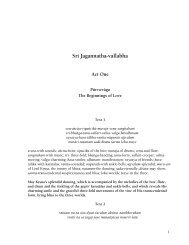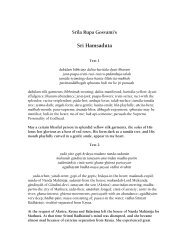Srimad Bhagavatam, Volume 3
Srimad Bhagavatam, Volume 3
Srimad Bhagavatam, Volume 3
You also want an ePaper? Increase the reach of your titles
YUMPU automatically turns print PDFs into web optimized ePapers that Google loves.
FOURTEENTH CHAPTER<br />
Disappearance of Lord Krishna:<br />
Sri Sura Uvacha:<br />
Samprasthite dwarakayam jisnou bandhu dtdriksaya<br />
Jnatum cha punya slokasya krishnasya cha vichestitam.<br />
Sri Suta uvacha—Sri Sutagoswami said: Samprasthite—having gone out,<br />
Dwarakayam—in the city of Dwarka, Jisnou—Arjuna, Bandhu—friends and<br />
reltives, Didrkshaya—for meeting them, Jnatum—to know, cha—also,<br />
Punyaslokasya—of One whose glortes are sung by Vedic hymns,<br />
Krihnasya—of Lord Krishna, Vichestitam—further programme of work.<br />
Arjuna went to Dwarka to see Lord Sri Krishna and other friends here<br />
and also for knowing from The Lord about His next activities.<br />
As stated in the Bhagwat Geet The Lord descended on the earth for protection<br />
of the faithful and anninihilation of the impious men and after the battle of<br />
Kuruklhetra and establishment of Maharaj Yudhtsthir the mission of the Lord<br />
was complete. The Pandavas specially Sri Arjuna was eternal companion of<br />
the Lord and therefore he went to Dwarka to know from the Lord about His<br />
next programme of work.<br />
Byatitah katichit masas ada nayat tato arjuna<br />
Dadarsa ghora rupani nimittani kurudbahah.<br />
Byatitah—after passing away, Katichit—some, Masah—months, Tada—at<br />
that time, Nayat—did not return, Tato— from there, Dadarsa—observed,<br />
Ghora—fearful, Rupani—appearances, Nimittani—various causes,<br />
Kurudbahah—Maharaj Yudhisthir.<br />
A few months had passed away and still Arjuna did not come back from<br />
there and Maharaj Yudhisthira also began to observe some inauspicious<br />
causes of appearances which were themselves fearful.<br />
Lord Srikrishna the Supreme Personality Godhead is ad infinitum more<br />
powerful than the most powerful Sun of our experience. Millions and billions<br />
of suns are created by Him and annihilated by Him within His one breathing<br />
period. In the material world the sun is considered to be the source of all<br />
productivity and material energy and due to the Sun only we can have<br />
necessities of life. Therefore, during the personal presence of the Lord on the<br />
earth all paraphernalia of our peace and prosperity specially religion and<br />
knowledge were in full display on account of the Lord's presence as much as<br />
there is full flood of light in the presence of the glowing sun. Maharaj<br />
Yudhisthir observed some discrepancies in his kingdom and therefore, he<br />
became too much anxious about Arjuna who was long absent and there were<br />
no news about Dwarka's well being. He suspected disappearance of Lord<br />
Krishna otherwise there was no possibilityof fearful causes of inauspicity.<br />
Kalasya cha gatim roudram viparyastar tu dharmanah<br />
Papiyasim nrinam vartam krodha lobha anritatmanam.<br />
Kalasya—of the eternal time, Cha—also, Gatim—direction, Roudram—<br />
fearful, Viparyastar—discrepancies, Tu—but, Dharmanah—specific function,<br />
Papiyasim—sinful, Nrinam—of the human being, Vartam—means of<br />
livelihood, Krodha—anger, Lobha—greed, Anritam—falsehood, Atmanam—<br />
of the people.<br />
He saw that direction of the eternal time had changed and it was very<br />
fearful. There was discrepancies in the seasonal regulations. The people<br />
in general had become too much greedy, angry and accustomed to<br />
falsehood. And he saw also that the people in general had adopted foul<br />
means of livelihood.<br />
When civilization is disconnected with the loving relation of the Supreme<br />
Personality of Godhead the symptoms like change of seasonal regulations,<br />
man's foul means of livelihood, all becoming too much greedy angry,<br />
affinitive for falsehood, all become too much rampant. Change of seasonal<br />
regulation means atmosphere of one season being manifested in another<br />
season for example the rainy season transferred to autumn or the fruits and<br />
flowers of one season becoming fructified in another season. A godless man is<br />
invariably a greedy, angry and accustomed to falsehood man. Such man can<br />
earn his livelihood by any means never mind black and white. During the<br />
reign of Maharaj Yudhisthir all the above symtoms were conspicuous by their<br />
absence. But Maharaj Yudhisthir was astonished to experience even a slight<br />
change in the godly atmosphere of his kingdom and at once he suspected<br />
disappearance of the Lord. Foul means of livelihood means deviation from<br />
one's occupational duty. There are prescribed duties for every one such as the<br />
Brahmin, Kahatriyas, Vaishyas and Sudras but any one of them who deviates<br />
from the prescribed duty and declares at the same to belong to the particular<br />
section it is called foul means of occupational duty. A man becomes too much<br />
greedy for wealth and power when he has no higher objective of life and when<br />
he knows only this earthly life for a few years is all in all. Ignorance is the<br />
cause for all these anomalies of the human society and to remove this<br />
ignorance of life specially in this age of degradation the powerful sun is there<br />
in the shape of <strong>Srimad</strong> Bhagwatam to distribute light.<br />
Jimbhaprayam byadahritam shathya misrancha souhridam<br />
Pitri matri suhrid bhratri dampatinam cha kalkanam<br />
15<br />
Jimbhaprayam—almost cheating, Byadahritam—in all ordmary transactions,<br />
Shathya—duplicity, Mishrancha— adulterated in, Souhridam—in the matter<br />
friendly well wishes, Pitri—father, Matri—in the matter of the mother,<br />
Bhratri—one's own brother, Dampatinam—in the matter of husband and wife,<br />
Cha—also, Kalkanam—mutual quarrel.<br />
All ordinary transactions and dealings become poluted with cheating;<br />
even they are mixed up with cheatings between a friend and friend. And<br />
over all in the family affairs there is always misunderstanding between<br />
father mother and sons, between wellwishers, between brothers and even<br />
with husband and wife there is always a strain of mind and quarrel.<br />
A conditioned living being in endowed with four principle of malpractices<br />
namely errors, insanity, inability and cheating. These are signs of<br />
imperfectness and out of the four one malpractice namely the propensity for<br />
cheating others is most prominent. And why this cheating practice is there in<br />
the conditoned soul because the conditioned souls are primarily in the<br />
material world imbued with an unnatural desire for lording it over the material<br />
world. A living being in his pure state is not conditioned by the laws because<br />
in his pure state he is conscious that a living being is eternally subservient to<br />
the Supreme Being and as such it is always good for him to remain as<br />
subservient, instead of falsely trying to lord it over the property of the<br />
Supreme Lord. In the conditioned state such living being is not satisfted even<br />
if he becomes actually the Lord of all that he surveys which he never becomes<br />
and there fore he becomes the victim of all kinds of cheating even with his<br />
most nearest and intimate relations. In such unsatistactory state of affairs there<br />
is no harmony even between the father and the sons or between the husnand<br />
and the wife. But all these contending difficultes can be mitigated by one<br />
sanguine process and that is devotional service of the Lord. The world of<br />
hypocrisy can be checked only by counteraction of devotional service of the<br />
Lord. and nothing else. Maharaj Yudhisthir having observed the disparities,<br />
conjectued dislocation of the Lord's presence on the earth.<br />
Nimityani ati aristani kale tu anugate nrinam<br />
Lobhadi adharma prakritim dristwa uvacha anuajm nripah.<br />
Nimityani—causes, Ati—very serious, Aristani—inauspicities, Kale—in<br />
course of time, Tu—but, Anugate—passing away, nrinam—of the humanity<br />
at large, Lobhadi—greed etc, Adharma—irreligious Prakritim—habits,<br />
Dristwa—having observed, Uvacha—said, Anujam—younger brother, Nripah<br />
the king.<br />
In course of time it has come to happen that people in general have<br />
become accustomed to greed, anger, pride etc and Maharaj Yudhisthir<br />
having observed all these serious inauspicities addressed his younger<br />
brothers and said.<br />
A pious king like Maharaj Yudhisthir at once became perturbed in mind when<br />
there was such inhumanly symptoms as greed, anger, irreligiosities hypocrisy<br />
rampant in the society. And it appears from this statemant that all the<br />
abovementioned symptoms of degraded society were unknown to the people<br />
of the time and it became astonishing for them to have experienced them with<br />
the advent of the Kali Yuga or the age of quarrel.<br />
Yudhisthira Uvacha<br />
Sampresito dwarakayam jisnur bandhar didrikshaya<br />
Jnatum cha punyaslokasya krishnasya cha vichestitam.<br />
Yudhisthira Uvacha—Maharaja said: Sampresito—has gone to,<br />
Dwarakayam—at Dwarka, Jisnur— Arjuna, Bandhur—friends,<br />
Didrikshaya—for sake of meeting, Jantum—to know, Cha—also,<br />
Punyaslokasya—of the Personality of Godhead, Krishnasya—of Lord Sri<br />
Krishna, Cha—and, Vichestitam—programme of work.<br />
Maharaja Yudhistir said to his younger brother Bhimasena as follows:<br />
"Bhimsena ! I sent Arjuna to Dwarka for meeting the friends as well as to<br />
know from the Personality of Godhead Krishna what about His<br />
programme of work."<br />
Gatah sapta adhuna masa bhimasena taba anuiah<br />
Na ayati kasya va hetor na aham veda idam anjasa.<br />
Gatah—has gone, Sapta—seven, Adhuna—upto date, Masa—months,<br />
Bhimasena—Oh Bhimasena, Taba—Your, Anuja— younger brother, Na—<br />
does not, Ayati—come back, Kasya—for what, Va—Or, Hetor—reason,<br />
Na—not, Aham—I, Veda—know, Idam—this, Anjasa—factually.<br />
"Since he has departed from this place it is now seven months past up to<br />
date but he has not as yet returned back from there and I do not know<br />
factually how things are going there."<br />
Api devarshina adistah sa kalo ayam upastithah<br />
Yada atmano angam akridam bhagawan utsisrikshati.<br />
Api—whether, Devarshina—by the demigod saint (Narada) Adistah—<br />
instructed, Sa—that, Kalo—eternal time, Ayam—this, Upasthitam—arrived,<br />
Yada—when, Atmano—of His ownself, Angam—plenary portion,<br />
Akridam—manifestation, Bhagawan—the personatity of Godhiad,<br />
Utsisrikshati—is going to quit it off.












